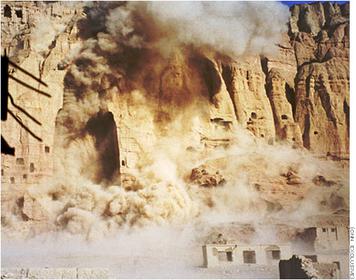 |
| Buddha Statues blown up by fanatics at Baminyan, Afghanistan |
 |
| Confederate statue pulled down by fanatics at Durham, NC |
Similar events abound in history; for example, the Beeldenstorm in the Netherlands:
 |
| Catholic statues and art destroyed by Calvinist fanatics in Antwerp, on 20 Aug 1566 |
... these fresh followers of this new preaching threw down the graven and defaced the painted images, not only of Our Lady but of all others in the town. They tore the curtains, dashed in pieces the carved work of brass and stone, brake the altars, spoilt the clothes and corporesses, wrested the irons, conveyed away or brake the chalices and vestiments, pulled up the brass of the gravestones, not sparing the glass and seats which were made about the pillars of the church for men to sit in. ... the Blessed Sacrament of the altar ... they trod under their feet and (horrible it is to say!) shed their stinking piss upon it ... these false bretheren burned and rent not only all kind of Church books, but, moreover, destroyed whole libraries of books of all sciences and tongues, yea the Holy Scriptures and the ancient fathers, and tore in pieces the maps and charts of the descriptions of countries.IOW, the Calvinists, taking their cue from Islam, regarded harmless statues as idols and the Catholics who had commissioned and carved them as idol-worshipers. They could no more regard them merely as works of art or historical value than the Taliban could so consider the Buddhas; or the protesters consider statues of Confederates.
-- Nicolas Sander, professor of theology at Louvain
The iconoclasm controversy roiled Byzantium in the 8th and 9th centuries. The Byzantine emperor Leo III officially prohibited their use in 730. Ostensibly, this was because of the Old Testament prohibition on worshiping graven images, albeit extended to ungraven images made of paint or mosaic tiles of colored glass. It was also likely reinforced by the staunch anti-image stance of the newly-triumphant Caliphate next door. It took an ecumenical council (II Nicea in 787) to get people to recognize the difference between a statue and an idol.
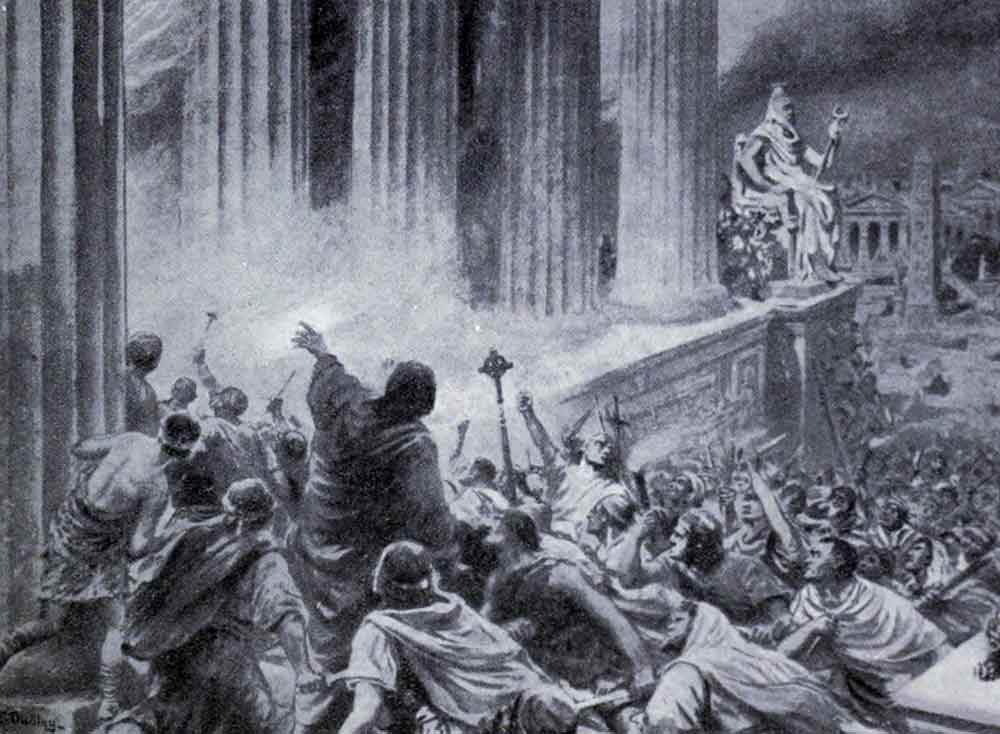 |
| Statue of Serapis destroyed in Alexandria, Egypt, AD 391 |
That is, Serapis really was an idol. It was, in the context of the age, not "a statue of Serapis," but Serapis Himself. Devotees actually did worship the statue. The other main difference is that while the destruction of the Serapeum is often portrayed as a rioting mob, it was actually torn down by imperial edict and carried out by troops acting under lawful orders. (Thus, more like the Byzantine iconoclasm or the Dutch Stille Beeldenstorm (Quiet Statue-storm), when officials finally managed to get in front of the rampaging mobs.) In Alexandria, the imperial edict was in response to a riot in which the pagans, using the temple atop the acropolis as a fortress, had sortied into the city and dragged numerous Christians up to the temple and slaughtered them there in ritual sacrifice.
Sidebar: While there is no evidence that the Serapeum contained any books at the time it was demolished, it is quite definite that the Church of Our Lady in Antwerp contained many books of all sciences and tongues.Yet the latter is never presented as an example of anti-intellectual behavior! Go figure.
Speaking of idols, many people today worship money; but TOF has never heard of mobs gathering to burn it.THE MODERN AGES HAVE BEEN CHARACTERIZED as (among other things) the Age of the Book; in particular, of the printed folio. (See here: second half). It was the age of the printed word, the λογος. And so the Modern Age was an Age of Logic, and for a while dared to call itself the Age of Reason.
With the passing of the Modern Ages, the Book has fallen from pride of place, superseded successively by the Movie, the TV, the Video -- in short, by the Image. For the first time in half a millennium, the primary imaginations of people are visual, not logical. "The new pastimes of the educated amateur," wrote Jacques Barzun in The House of Intellect, "are the arts of nonarticulate expression: music and painting… Everywhere picture and sound crowd out text."
Violence is the ultimate in nonarticulate expression. An easy response to annoyances by people who can no longer expressing themselves well with words. (Other than the obligatory Three Word Chant.) Recently, here in PA, two motorists, jockeying for right of way as Route 100 narrowed from two lanes to one, resolved the difficulty when one of them pulled a gun and shot the other in the head.
The destruction of the art of one's opponents is simply an extreme form of "road rage,"
A loosely-defined group calling itself Antifa (apparently with no sense of irony) justifies such violence on the basis that their opponents are bad people who do not deserve to speak. Only acceptable speech should be allowed: "goodthink," as it was called in a book once. Thus, if someone is speaking (or is believed to be about to speak) words-we-don't-want-to-hear, it is perfectly permissible to rush the platform, block entrance to the venue, set fire to buildings, or beat people with clubs or pipes... all the while accusing the silenced speaker of "aggression."
The exquisite torture of contrary opinions is called "aggression" by people who have not experienced the real thing.
 |
| When microaggressions were macro. A white mob of a couple thousand shouting threats at a couple hundred open-housing marchers in Milwaukee in the 1960s. |
Of course, this tactic of mobbing opposition speakers is precisely what the actual fascists did in the 1920s and 1930s.
 |
| Squadristi destroying opposition newspaper office |
Robert E. Lee, for example, did not own any slaves, although he employed a "free man of color" (as they phrased it in those days). When he inherited 200 slaves from his father-in-law, he not only freed them in accordance with that will, but helped them relocate and find positions. Regarding secession, he had said while in the Department of Texas that "secession is nothing but treason." Nonetheless, when it seemed that Virginia (which did not secede right away) was to become a theater of war, he could not sit by and see his homeland destroyed, no matter how righteous the destroyer.
Instead of pulling the statue down, why not relabel it? Use it as a caution if you must how an honorable man, skilled in his profession, might be led by love of his home to take sides with others less honorable. The statue of the ordinary Confederate citizen-soldier, pulled down in the photograph above, might be relabeled with the motto: "Rich Man's War; Poor Man's Fight," a frequent comment by the rank and file in that conflict.
General Longstreet has few to no statues to him in the South. This is because after the war he joined the Republican Party and became a civil rights advocate. During protests of election irregularities in 1874, referred to as the Battle of Liberty Place, an armed force of 8,400 White League members advanced on the State House. Longstreet commanded a force of 3,600 Metropolitan Police, city policemen, and African-American militia troops, armed with two Gatling guns and a battery of artillery. He rode to meet the protesters but was pulled from his horse, shot by a spent bullet, and taken prisoner. The White League charged, causing many of Longstreet's men to flee or surrender. There were casualties of 38 killed and 79 wounded. Federal troops were required to restore order. Longstreet's use of black troops during the disturbances increased the denunciations by anti-Reconstructionists. Why not raise a statue to Longstreet.
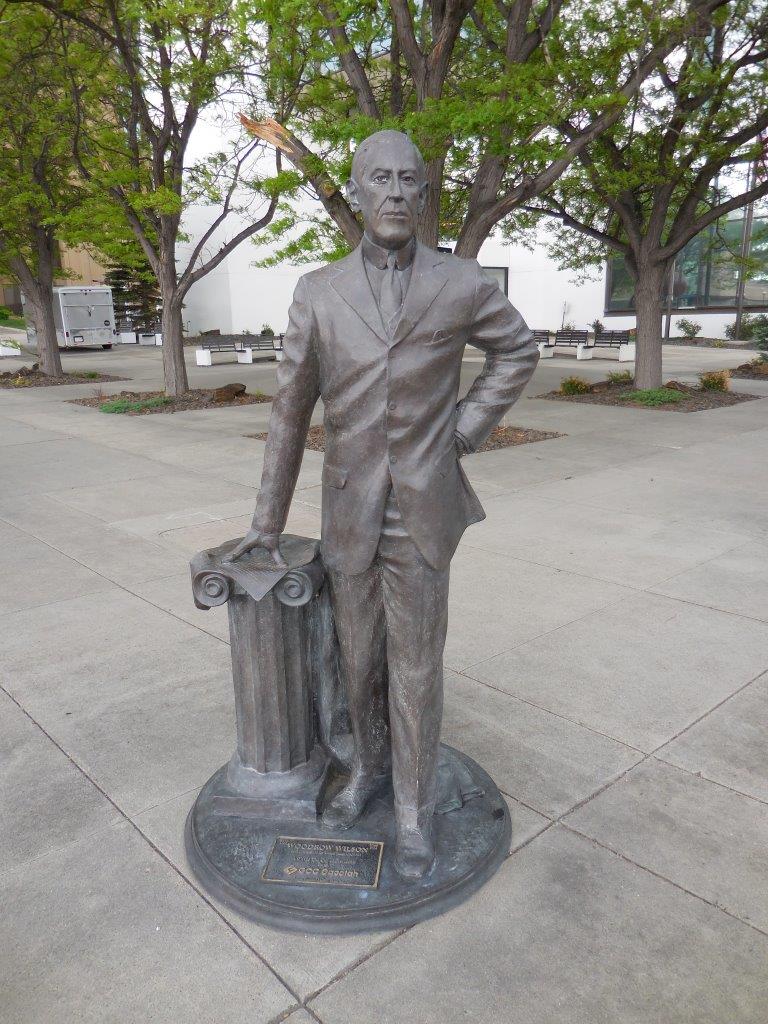 |
| Woodrow Wilson, Rapid City SD Segregated the federal civil service and the military Screened Birth of a Nation in the White House |
OTOH, one might also protect statues of Sen. Robert Byrd (D, WVa: 1959-2010), who had actually joined the Ku Klux Klan, achieving one of their absurdly-named offices and personally organizing a chapter.
Or a statue of Woodrow Wilson, who segregated the civil service, the postal service, and other federal functions? Should The Democratic Party Be Abolished As A Symbol Of Oppression?
***
There are statues of Lenin and of Che Guevera* in New York City. Where are the protestors demanding removal of these statues to mass murderers?
(*) Sophists have argued with a straight face that the Che statue is not a statue of Che, but rather a statue of an actor who had portrayed Che.)
/cdn.vox-cdn.com/uploads/chorus_image/image/55208271/lenin_return_1_wm_620x465.0.jpg) |
| Lenin addresses New York from his balcony |
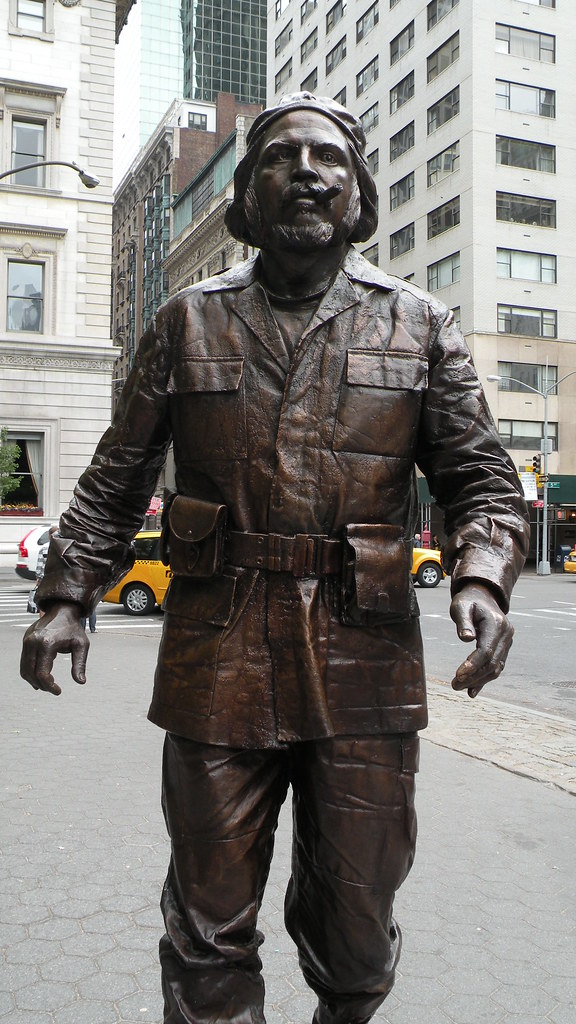 |
| Che in Manhattan? Or an actor portraying Che? |
Well, reason and logic and the written word were fine things, and we may learn to miss them when they are gone. But youth loves the iconic pose and as Nietzsche once noted, the sputtering fuse. The new rules of debate are to answer your opponent by driving over him, or putting a bullet in her brain; or simply punching him in the face.
TOF wonders to what extent domestic and workplace violence is part of this new social movement.
 |
| Progressive Antifa demonstrators dressed like ISIS fighters |
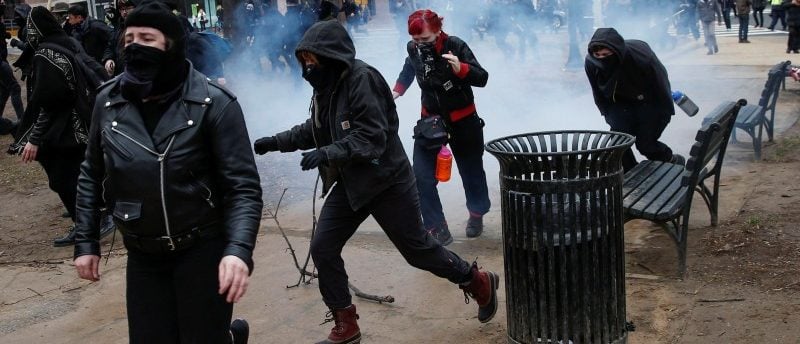


Who downplayed it?
ReplyDeleteAnyone who refuses to show sufficient outrage over artefacts with cooties. Report yourself for re-education, Comrade.
ReplyDeleteIn my estimation, talking about slave cooties is akin to positing Holocaust cooties.
ReplyDeleteIn the end, the differences between those two men had greatly receded: https://en.wikipedia.org/wiki/Nathan_Bedford_Forrest#Speaks_to_black_Southerners
DeleteMichael, when do you think the righteous left will get around to demonizing such human sex traffickers as Maya Angelou, who once ran a brothel, or the pimp "Detroit Red" (AKA Malcolm X). "Former-" doesn't seem to excuse too many these days.
ReplyDeleteTOF
ReplyDeleteI don't carry water for the left or right, but Woodrow Wilson has been castigated by the left as a racist. Yet I agree with you about Soviet dictators and guerilla leaders. Your initial comments just appeared to mitigate the horror of slavery.
The word you want is "downplay". "Mitigate" means actually make less bad, not make seem less bad.
DeleteAnd nobody with any wide reading is particularly impressed by the "horror" of American slavery. Ottoman and Mughal slavery were far worse and lasted centuries longer. Roman slavery was much worse. Slavery to the Southern Plains cultures, at least, was much worse.
This comment has been removed by the author.
DeleteThis comment has been removed by the author.
DeleteWell, if your schools had not substituted Sunday-school lessons for history—and if you did not mistake movies for historical documents—you would know that actually, racism was motivated by slavery, not the other way around. The ancient and universal human custom of chattel slavery was no longer consonant to the values the Americans and English colonists before them now held, however imperfectly—so they needed a rationalization. That rationalization was to deny that the common bond of man and man existed between them and slaves.
DeleteRoman slavery did not have that excuse—they didn't need to dehumanize their slaves before they brutalized them. They did the same as American slavery, and worse, to people who not only looked like them, but were them. At various times, somewhere between two- and three-fifths, or more, of Roman slaves were Romans—mainly debtors. And yes, it was much worse; the rumor that a prominent gourmet had fattened his conger eels on the flesh of slaves was probably false—but it was plausible. Nothing of the kind was conceivable in the American south at its worst.
What group of hate-motivated, history distorting inbred redneck trash do you belong to?
TOF
DeletePlease keep in mind the context of my remarks. I was trying to show that those who deny the horror of chattel slavery in America are just wrong. You even admit those acts are horrible, and they're documented in American history. That was my point.
However, in answer to your question, we first have to define what we mean by slavery. That is a long and complex topic. Let's say that even if Africans in America were never cursed, beaten, called racial epithets, raped and so on, it still would not have been just to hold these men and women against their own will and treat them as property to do whatever with them. I hope you see how the kind of slavery I'm discussing is not the same as working for minimum wage or some other scenarios that might be posed. Thanks for the interesting volleys.
This comment has been removed by the author.
DeleteThat is some awfully big talk from someone whose understanding of history would be barely tolerable in a middle-schooler. No adult would think there was anything special or remarkable about American slavery, except its dissonance with America's other values. Again: American slavery is one of the milder examples of chattel slavery (which is most slavery, globally and historically; you repeat the word like you think it's significant, apart from America's being the only instance of full chattel slavery in Christian history).
DeleteThe point, O child educated by after-school specials—maybe, being generous, by coffee-table books authored by journalists—is that the only thing saying Robert E. Lee's statues have to come down, but Quanah Parker's don't, is that you're racists. Either you don't believe Comanches have full moral agency, or you believe their wrongs—and their slavery was absolutely the most brutal that ever existed—are somehow less important than those committed by whites.
My last reply to you, O woefully-named one, is that you talk big, make plenty of assertions and insults, but adduce no evidence for your baseless claims. It's all good, O non-sophic one.
DeleteMaybe this educational link will bring you up to speed
https://www.nytimes.com/2014/10/05/books/review/the-half-has-never-been-told-by-edward-e-baptist.html?mcubz=1&mcubz=1
Ah yes, noted history journal the New York Times.
DeleteBaseless claims? Ask literally any historian what Roman slavery was like. Or Ottoman. Or Mughal. Or Comanche (or any Southern Plains Culture). Or pretty much any of the civilizations of Peru. Actually...can you please tell me, in your own words, what I'm claiming? So far you've just demonstrated childish inability to read for comprehension.
When you're protesting Comanche and Kiowa leaders having statues, we'll believe you actually mind slavery. Till then, you're a dimwitted little Anglo Jingo. You believe American slavery was special because America's is the only culture you know anything about.
And you probably want to figure out how to sign your name before you talk about anyone else's intellect, Puzzlewit McDroolbib.
Can we turn down the temperature a bit, folks?
DeleteAnon, would it kill you to specify why slavery in the US South was worse than slavery by the Comanches or the Turks?
Sophie, same question. What about the slaveries in other cultures made them worse?
This is what I meant by slavery cooties turning people into crazies. It simply must be the worst possible thing imaginable or you become a moral leper. There are no degrees, and a slavery here is no different than a slavery there.
And yet, as some have observed, the US South agreed to end the slave trade in 1803 and US ships helped out in the anti-slavery patrol with the Brits and the French. But the Portuguese adamantly kept it up.
That's because Brazil (and the Caribbean needed to import slaves because they died off faster than they could reproduce, while in the US South, they reproduced well enough that they needed no slaves from Africa. This alone suggests that conditions for the slave were far worse in Brazil than in the South.
But that's like noting that penalties meted out by Inquisitorial tribunals were milder than those meted out by civil courts in Europe. Those riding the moral high horse start accusing you of approving of the Inquisition.
Things were worse and better for slaves in Brazil. Sugar plantations are a very dangerous form of agriculture (something to do with the large-scale burning that is, or was, a part of the process, I think), so they had a high death-rate; but Portuguese slavery was not full chattel slavery, their slaves had a few legal rights, notably their marriages had legal force and their families couldn't be broken up. (Notice that African religions, with a thin Christian veneer, persist in the Caribbean and Brazil, but are virtually unknown in the continental US.)
DeleteIt's like a Chinese factory worker vs. an Alaska fisherman. The latter has more rights but his job is also more likely to kill him.
And the Comanche were worse because, among other things, they always gang-raped their female captives, except occasionally for virgins who they hoped to sell later. It wasn't just optionally allowed, like in the South; it was the absolute by-the-book standard practice. (They also always raped those virgins if they were ransomed before they could be sold, pretty much just to be spiteful.) They also routinely tortured and mutilated their slaves—who also had shorter life-expectancy than slaves in mines or sugar-plantations (both much more dangerous than cotton-plantations), because of how brutally the Comanche overworked (and abused) them.
The Turks and Mughals didn't restrict themselves to raping female captives; a major factor in the current Hindu animus against homosexuality (the taboo seems to be ancient but it hasn't always been a crime like it currently is) was its association with rape by Islamic slavers (something that's also true in parts of Africa). Sexual slavery was central to the Ottoman system; to claim it was anything but a sideline in the American one is to talk nonsense. (The Comanche, too, usually murdered men; they only wanted sex-slaves. Many of their female captives were gang-raped to the accompaniment of their male relatives being tortured to death.)
This comment has been removed by the author.
DeleteThe Democratic Party should be abolished as the most corrupting influence in American politics. Way more than money, although the Democratic party marches on its wallet.
ReplyDeleteAmerican slavery, while the worst in Christendom, was fair-to-middlin' by human standards. Ottoman and Mughal slavery made it look like summer camp.
ReplyDeleteFunny nobody demands Turkey pay anyone reparations...
TOF,
ReplyDeleteYou seem like a reasonable bloke, but to my knowledge, I never claimed that US slavery in the South was worse than slavery practiced by the Comanches or the Turks. The point I was trying to make--not the caricature made of my position--is that American slavery was horrible on many levels and worse than Roman slavery. The racial component alone coupled with the severe abuse and breakup of families made American slavery extremely brutal. What about the daily beatings, the rapes, continual use of racial epithets and overall dehumanization of blacks during that time followed up by Jim Crow laws?
It bugs me when people try to compare holocausts, so I don't want to be that kind of person--my holocaust is worse than yours! But it's hard for me to see how anyone who calls himself Christian (I don't mean you) can't acknowledge slavery as America's original sin, one characterized by less than Christian attitudes and actions.
Signed,
Nemo
Roman slavery that involved the rumor—plausible enough to be spread, even if untrue—that a prominent gourmet fattened his eels on slave-flesh? Nothing remotely comparable would be conceivable in the American south. Must've missed the South having a roaring trade in prepubescent sex-slaves, and forbidding the sale of children under seven to brothels being a step taken by a very forward-thinking leader (the Emperor Tiberius).
DeleteWhen a land-owner was suspected of a crime, the South didn't automatically put every single slave on his estate to torture, on the off-chance they knew something. The Romans did. Beatings and rapes were absolutely commonplace. As were branding and mutilation. Rome had plays with real onstage murders, with slaves purchased just for the purpose—can you point me to when the South did that?
Roman slaves had no more families than the American ones did; in fact I seem to recall the Americans modeled their policies on slave families on the Roman laws. It was illegal (though not considered murder) to summarily execute an American slave; that was not the case for Roman ones.
The Southerners did not have moralists strongly recommending that elderly slaves be sent into the mines to be worked to death and thus minimize the time they were a drain on the household finances. The Romans did.
As for "racial epithets and dehumanization", again: the Romans didn't need to dehumanize their slaves in order to brutalize them in a manner the South would've found unthinkable.
Slavery is not America's original sin, because institutions and communities don't have sins, only individuals. But why is anyone surprised that a country founded by heretics, whose ancestors were murderers and thieves even before they were heretics, behaves in an un-Christian fashion? Look up what the Saxon savages did in Ireland; look up what they did in the Hundred Years War. Hell, it's entirely possible the English colonies were the only Christian territories where masters had sexual rights to their slaves, because their first slaves were Irish POWs—the English having used rape as a weapon of terror against the Irish since Cromwell if not Elizabethan times.
Was slavery the worst thing America did? Oh I don't know. Genociding tens of thousands of Californian natives is probably worse. Toppling governments in Guatemala for the sake of fruit tariffs is probably worse...and has resulted in slavery for many Guatemalans that persists to this day. Dooming millions to slavery under "Uncle Joe" Stalin at Yalta—slavery that happened in living memory and not only dwarfs our plantations to insignificance, but easily outdoes the German death-camps for the thoroughness and scope of its brutality, is actually the worst thing we ever did.
Moral posturing is not a substitute for factual knowledge.
Strictly speaking, slavery based on race is a relatively recent concept. It began in the early 16th century and came to the American colonies in 1619. Doesn't make it any better but helps to understand how it evolved. BTW the US in 1808 struck the first blow against Islamic slavery with a raid on Tripoli by Stephen Decatur. Pity it was not followed up by the Europeans against other Muslim countries.
ReplyDeleteActually it only became based on race later on; they needed a rationalization for the slavery that was not consonant with their other values, and hit on "it doesn't count if the victim is racially inferior". But the first slaves in the English colonies were Irish; the Spanish and Portuguese only sought African slaves because the 1551 Valladolid debate banned enslaving the New World's natives ("Valladolid never said anything about Africans").
Delete